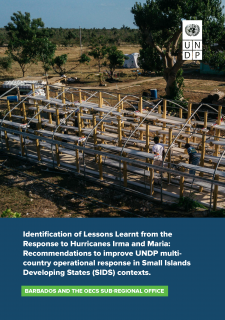UNDP Caribbean Recovery Program - Lessons Learned
During the period September 6-19, 2017, the Small Island Developing States (SIDS) of the northern and eastern Caribbean were battered by two powerful Category 5 Hurricanes - Irma and Maria. In Dominica, the British Virgin Islands (BVI) and Barbuda these hurricanes decimated critical infrastructure, housing and livelihoods. These islands fall under the responsibility of the UNDP Sub-regional Office for Barbados and the OECS. Other islands such as Sint Maarten and Turks and Caicos were also part of the initial response in the Caribbean. The 2017 response highlighted the logistical and operational complexities of launching a multi-country response and recovery operation in small island contexts where UNDP may not have a substantive presence. Few days after the first hurricane and articulated by the strong commitment of the Regional Senior Management, the Government of China donated US$ 5m to UNDP for a re-roofing reconstruction programme. This intervention, the first of its nature in the region and one that triggered a lot of corporate attention, demanded the quick procurement of some US$ 4m of construction materials, equipment and tools to be distributed in Dominica and Barbuda. The operation was extremely complicated given the geographical challenges associated with the Caribbean, the multi-country nature of the programme, the lack of UNDP presence in those islands and the weak capacities and limited infrastructure of the countries devastated by the natural disaster among other reasons. The project was not “business as usual” and pushed the comfort zones of UNDP teams. One year after the disaster, presents an optimum opportunity to take stock of things that have worked and to learn from those that need improvement. To this end, a review study was launched on 27 November 2018 with the main objective of identifying lessons learnt and making practical recommendations for optimal operational response arrangements in a post-disaster context in SIDS. The review focuses on the procurement experience of UNDP Barbados and the OECS Sub-regional Office and the interactions with RBLAC, the Regional Hub and Project Offices in Antigua and Barbuda and Dominica. Data for the study was collected from key documents and semi-structured
interviews with 25 participants from 28 November to 20 December 2018.
In the first place, it is important to highlight that UNDP teams in different locations successfully managed to find creative solutions to address a wide array of challenges and that project results exceeded the expectations of national governments and partners. This was possible thanks to the strong leadership at different levels, creative teamwork, plentiful calls and meetings and the commitment and professionalism of colleagues in New York, Panama, Barbados, Dominica and Antigua and Barbuda. This said, since the main purpose of this review is to identify key operational areas that would demand attention should a similar UNDP response be required, the document will focus on challenges and practical recommendations for improvement. Main findings from the interviews highlight the need to improve communication and information sharing among the teams involved in the operational response working in five different countries. The lack of clarity regarding roles and responsibilities, and the need to strengthen the Country Office and impacted countries capacities have been also underscored. With the information gathered during the interviews, the team facilitating this study has put forward a few key practical recommendations aiming to tackle most of the main challenges experienced. Understanding that substantial operational changes need to start somewhere, implementing just a few of these recommendations would have an extraordinarily positive impact in future UNDP responses in similar contexts.

